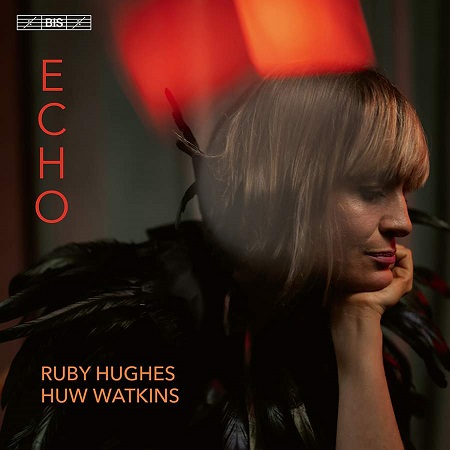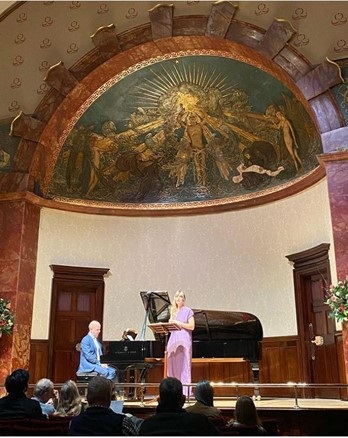Travelling into central London on Sunday afternoon was a slightly strange experience. At least there were trains – never a given these strike-strife days – but footfall was light, despite Christmas Day being just a week away. The Oxford Street festive lights were doing their best to dazzle through the drizzle, but Messi v. Mbappe seemed to be more of a draw than Santa at Selfridges. At Wigmore Hall, though, a small but attentive and appreciative audience gathered to hear soprano Ruby Hughes launch her new disc, Echo, with pianist Huw Williams, whose 2017 song-cycle gives the disc – a meditation on loss and mourning – its title.
Hughes is a striking songstress-storyteller. She holds back, but draws the listener in. Her soprano is pure, vibrato-light, but immensely expressive. Purcell realisations by Michael Tippett and Thomas Adès opened the programme, the piano’s gentle treads and trailing fragments cohering beautifully as Hughes spun sweet but delicate vocal lines that seemed otherworldly at times. In Tippett’s arrangement of ‘Music for a while’ a distant dreaminess prevailed, as the piano’s falling lines seemed to tumble back from the present into the past, while the vocal melody pushed tentatively forwards. ‘By beauteous softness mixed with majesty’ from the Ode for Queen Mary’s Birthday, Now Does the Glorious Day Appear, was sparser still, the piano etching a quiet space for the voice to explore. Simultaneously simple yet sophisticated, the song grew in strength and direction, and in the piano postlude, in which Adès releases the resonances and registral expanse of the piano, Watkins relished the plummets dark and deep.

Arrangements by Benjamin Britten continued the conversation between past and present. Hughes took her time in ‘I wonder as a I wander’, Watkins’ traceries improvisatory in manner between the unfolding of the spacious vocal line. The soprano held the melodic climax of each stanza, the high note suspended, poignant but purposeful, creating intensity in an understated way. The final verse moved forward but the reprise of the opening reflections was wistful, a hint of weariness in the wonderings. “How sweet the answer Echo makes/ To Music at night”: the opening line of Thomas Moore’s ‘How Sweet the Answer’ sums up the song – with its tender, rocking give-and-take between piano and voice – and indeed the whole recital programme. The impressionistic ambience established by the piano at the start gave way to deeper meditations in the central stanza, before the calm exchanges between singer and piano – “Breath’d back again” – sighed into silence. Hughes’ restraint, even when the voice rose high, and Watkins’ delicacy of touch made this song a moving reverie.
Deborah Pritchard’s ‘The World’ (2021) is a setting of Henry Vaughan’s poem, ‘I saw Eternity the other night’, the opening line of which startlingly conjoins the numinous and the commonplace. Pritchard responds to Vaughan’s figurative embodiment of the abstract mystery – “Like a great ring of pure and endless light” – with musical rhetoric and rhapsodic richness, and Hughes and Watkins persuasively captured the mood of vertiginous, euphoric mysticism. The piano’s final long-held note segued into Cheryl Frances-Hoad’s ‘Lament’ (2012), a setting of a poem by Andrew Motion, specially written for the composer. Hughes’ response to Frances-Hoad’s sensitive exploration of the poetic imagery was deeply expressive, the phrase “But he slipped through/ Into the gold fire” diminishing into the distance even as it glowed from within. The final stanza, “Then we shall walk out/ Together as before/ Hand in hand/ Through the streets and the parks/Where birds sing/ When the rain passes away”, was beautiful in its quiet simplicity.

Watkins’ Echo (2017) was the most substantial work in the programme, and the centre of the recital. Written for Hughes to perform at Carnegie Hall, it sets poems by Christina Rossetti, Emily Dickinson, Philip Larkin, W.B. Yeats and David Harsent which reflect on melancholy, grief and irrevocable loss.
The piano’s flutterings at the opening of ‘Echo’ suggested the quivering flow of the spirits of lost loved ones that return in dreams, “Come to me in the silence of the night”, while Hughes’ vocal line was characteristically pure and pristine, yet, even in the quietest moments, imbued with emotion. Her diction was exemplary, and the diminuendo of the final phrase, “As long ago, my love how long ago”, exquisitely tapered. ‘For each ecstatic instant’ (Dickinson) began with a dizzying tumble into the piano’s depths, and restlessness prevailed in the opening stanza, before giving way to calmer lyricism, though the consolations of the gentle rocking were tinged with disquiet.
Watkins’ setting of Larkin’s ‘If grief could burn out’ pushed Hughes’ voice low, where it found a warm softness, the vocal line tenderly trailed by the piano, the vocal colours subtly shifting with each textual repetition. Both performers’ attention to detail was striking, and the breadth of Watkins’ vocal lines conveyed the honest acknowledgement of Larkin’s sombre vision: “The flames have left,/ And grief stirs, and the deft/ Heart lies impotent.” The busy piano textures of ‘When you are old’ (Yeats) almost overwhelmed the voice initially, but Hughes rose fiercely to articulate the poet-speaker’s almost accusative declaration, “But one man loved the pilgrim soul in you”. ‘Baby blue’ (Harsent) made for a disturbing close, beginning with explosive dissonance and harshness and wide vocal leaps, expertly negotiated by Hughes, stilling temporarily, then climaxing with a high, burning cry of anguish: “As she catches a glimpse of the sky through the skull.”
The programme opened with the Sarabande from Johann Sebastian Bach’s Partita No.4 in D. Watkins’ sensitivity and restraint were mesmerising, as delicate adjustments of balance, weight and tempo created wistful threads that wove together as if to form a precious tapestry, fragile yet enduring. An intimate rendering of Errollyn Wallen’s carol ‘Peace on Earth’ brought the recital to a close, the patterning and repetitions at once both soothingly affirmative and suggestive of what Wallen herself has described as ‘the bleakness of winter in a turning, troubled world’.
Claire Seymour
Ruby Hughes (soprano), Huw Watkins (piano)
J.S. Bach – Partita No.4 in D BWV828, Sarabande; Henry Purcell – ‘Music for a while’ (from Incidental music for Oedipus, King of Thebes Z583, arranged by Michael Tippett), ‘By beauteous softness mixed with majesty’ (from Now Does the Glorious Day Appear’ (Ode for Queen Mary’s Birthday) Z332, arranged by Thomas Adès); Huw Watkins – Echo; Benjamin Britten – ‘I wonder as I wander’ (based on John Jacob Niles), ‘How sweet the answer’; Deborah Pritchard – ‘The World’; Cheryl Frances-Hoad – ‘Lament’; Errollyn Wallen – ‘Peace on Earth’.
Wigmore Hall, London; Sunday 18th December 2022.